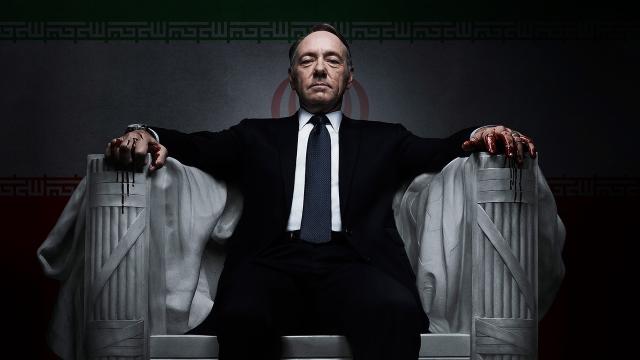The Iranian people are really enjoying the Netflix show House of Cards right now. Yesterday, the New Yorker reported that the first season of the show has aired on state-run TV, despite bans on virtually all American cultural products. But it got me thinking: Does Netflix have a licensing deal in Iran or is the country airing pirated copies of the show? And what about all those sanctions?
I reached out to both Netflix and Sony Pictures Entertainment, the company that licenses House of Cards for international broadcast. Sony said it wasn’t something they could comment on, which just made me more intrigued. If the distribution companies got a special exemption from the existing sanctions to air the show in Iran, who made that decision and why? And if Iran is airing pirated copies, how do US intelligence agencies feel about it?
The show, known as “House of Straw” in Iran, is dubbed in Farsi, and has been running every night for two weeks straight. Iranians have been following the American election closely, and House of Cards gives viewers there a taste of American political drama through the eyes of Frank Underwood, a cutthroat politician with disturbingly low ethical standards.
The working assumption is that the TV broadcasts of House of Cards are being permitted by Iranian authorities because they paint a dark and seedy view of American politics. And that could be true. But who’s allowing these broadcasts to occur on the American side, if at all? Iran and the United States don’t currently have any kind of copyright agreement, but the US certainly has sanctions against doing business with Iran.
So would a formal licensing deal between Netflix or its distributors and Iran be illegal? It’s tough to say. There are plenty of exemptions to the sanctions, including things like food, medicine, and medical devices. But Dr. Bryan Early, an expert on economic sanctions at the Rockefeller College of Public Affairs and Policy in Albany, tells me that there are “case-by-case exemptions given for cultural and democratization purposes.”
Eric Lorber, a senior associate at the Financial Integrity Network, says that, “while there is some ambiguity, this activity would most likely be permitted. Under the relevant law (the Iranian Transactions Sanctions Regulations, or ITSR), there is an exemption for US persons providing information or informational materials to Iran/persons in Iran, which may apply here.”
But just because it’s probably legal doesn’t mean that American companies are always excited to do business with Iran.
“Given the severity of recent sanctions, many companies have been deterred from engaging in even legal commercial transactions with Iranian partners given the difficulty of ensuring compliance with existing sanctions policies and risks associated with potential violations,” said Dr. Early.
During the Cold War, US intelligence agencies discovered that movies and TV shows were vital tools of “soft diplomacy” that could introduce the populations of adversarial nations to American culture and ideas. The US Information Agency (USIA), the Cold War propaganda arm of the US government, spent millions to help distribute movies overseas. And Congress even passed laws in the 1950s that guaranteed Hollywood could get paid in American dollars in countries where currencies were weak or fluctuating rapidly. That program died in 1967 after it became a minor scandal that the sale of Tarzan comic books in Israel was being subsidized by American taxpayers.
To understand how powerful this kind of media distribution can be for American interests, all you need to do is talk with people who were watching illegal American action movies behind the Iron Curtain in the 1980s. The 2015 documentary Chuck Norris vs Communism (now streaming on Netflix) is a great testament to that. Watching American action heroes driving fast cars, sleeping with beautiful women, and defeating the bad guys planted cultural seeds that were arguably as important to US interests during the Cold War as any defence spending.
Which all leads me to wonder if the United States government would welcome an exemption of Iranian sanctions for TV shows like House of Cards, even if the show features fictionalized American corruption and even murder (spoiler alert). Getting American entertainment in front of Iranian eyeballs could probably be seen as a win for US interests. After all, the President of the United States watches and enjoys the show.
And perhaps more importantly, the Iranian population is much more open to American culture than many Americans realise. If Netflix is distributing the show, that’s probably seen as a positive move the perspective of the US government, according to Dr. Early, and “generally consistent with the idea that sharing US media with other countries, especially countries whose governments have adversarial stances towards the United States, is a good thing.”
“This is also consistent with the old story from back in mid-1990s that Baywatch was the most popular show in Iran,” Dr. Early continued. “The Iranian public has generally had consistently better views of the United States than its government’s bellicose statements and policies would lead one to expect.”
The long and the short of it? House of Cards airing in Iran, even with all the show’s seediness, is probably seen as a net positive by the US government, no matter how it got there.
“House of Cards does depict a rather dark view of the US Government, but it’s ultimately a very entertaining work of fiction,” Dr. Early said. “Whatever the motivations are for the Iranian Government sanctioning the deal to show the program, I think you can generally assume that Iranian audiences are sophisticated enough to understand that the program is fictional and appreciate the show for what it is — great TV.”
